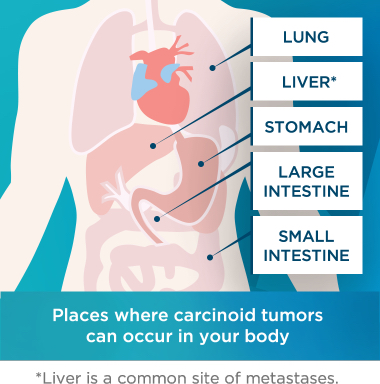Metastatic Carcinoid Tumors
There are many types of cells throughout the body. Some of these cells are called neuroendocrine cells. These cells are unique because they affect both the nervous system and the endocrine system.
The nervous system helps send signals out across nerve pathways that control things like movement. The endocrine system helps regulate hormones in your body.
The nervous system and the endocrine system work together to keep your body functioning regularly. However, if neuroendocrine cells grow out of control, they can form a tumor, which can lead to serious medical problems.
Metastatic carcinoid tumors are a type of malignant (cancerous) neuroendocrine tumor that has already spread to other places throughout the body, such as the liver.
Metastatic carcinoid tumors most commonly arise from neuroendocrine cells found in the gastrointestinal (GI) tract, which includes the stomach as well as the small and large intestines (see figure).
What Is Carcinoid Syndrome?
Carcinoid syndrome refers to the group of symptoms that result from functional carcinoid tumors. When carcinoid tumors start to spread, or metastasize, they can cause sudden and severe symptoms. These symptoms are the result of an increased release of hormones by the carcinoid tumors.
Medical Therapy for Carcinoid Syndrome
There is medicine available to help you control the severe diarrhea and flushing associated with metastatic carcinoid tumors (carcinoid syndrome). Antidiarrheal medications do not always work to control the severe diarrhea associated with carcinoid syndrome.
Your doctor will discuss the best treatment for you and help set up a treatment plan. It is important that you speak to your doctor about starting treatment at the first sign of symptoms.
Sandostatin® (octreotide acetate) for injectable suspension is similar to somatostatin, a hormone that occurs naturally in the body, and works directly at the site of the metastatic carcinoid tumors to help decrease the production of hormones that lead to the severe diarrhea and flushing of carcinoid syndrome.
Sandostatin has been used to treat patients who have severe diarrhea and flushing associated with metastatic carcinoid tumors (carcinoid syndrome) for over 30 years.*
*Includes Sandostatin® (octreotide acetate) Immediate-Release and Sandostatin LAR Depot for
all approved indications.


